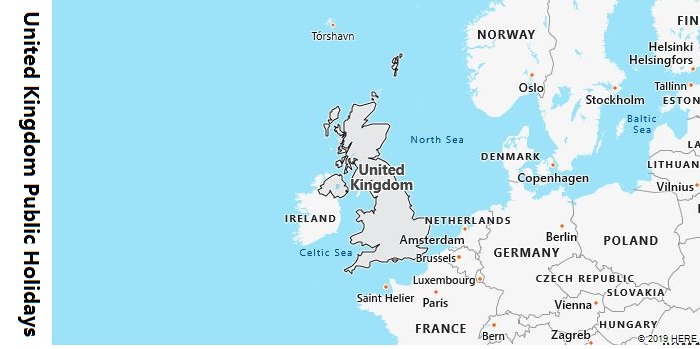United Kingdom Holidays
United Kingdom Public Holidays
Searching for the national holidays in United Kingdom? All public holidays in United Kingdom are treated like Sundays. This means that most of the United Kingdom employees have a day off and all schools are closed on these office holidays. If you are planning a trip to United Kingdom and want to know what the national and regional holidays are, check the details in the tables below.
List of Official Holidays in United Kingdom for Year 2020
| # | Date | Holiday | Day |
| 1 | January 01, 2020 | New Year’s Day | Wednesday |
| 2 | January 02, 2020 | Day after New Year’s Day | Thursday |
| 3 | January 25, 2020 | Burns Night | Saturday |
| 4 | February 25, 2020 | Pancake Tuesday | Tuesday |
| 5 | March 01, 2020 | St. David’s Day | Sunday |
| 6 | March 17, 2020 | St. Patrick’s Day | Tuesday |
| 7 | March 22, 2020 | Mothering Sunday | Sunday |
| 8 | April 10, 2020 | Good Friday | Friday |
| 9 | April 13, 2020 | Easter Monday | Monday |
| 10 | April 23, 2020 | St. George’s Day | Thursday |
| 11 | May 08, 2020 | Early May Bank Holiday | Friday |
| 12 | May 25, 2020 | Spring Bank Holiday | Monday |
| 13 | June 21, 2020 | Father’s Day | Sunday |
| 14 | July 13, 2020 | Battle of the Boyne | Monday |
| 15 | August 03, 2020 | Summer bank holiday | Monday |
| 16 | August 31, 2020 | August Bank Holiday | Monday |
| 17 | November 05, 2020 | Guy Fawke’s Night | Thursday |
| 18 | November 08, 2020 | Remembrance Sunday | Sunday |
| 19 | November 30, 2020 | St. Andrew’s Day | Monday |
| 20 | December 25, 2020 | Christmas Day | Friday |
| 21 | December 28, 2020 | Boxing Day | Monday |
List of Official Holidays in United Kingdom for Year 2021
| # | Date | Holiday | Day |
| 1 | January 01, 2021 | New Year’s Day | Friday |
| 2 | January 01, 2021 | New Year’s Day | Friday |
| 3 | January 04, 2021 | Day after New Year’s Day | Monday |
| 4 | January 04, 2021 | Day after New Year’s Day | Monday |
| 5 | January 25, 2021 | Burns Night | Monday |
| 6 | February 16, 2021 | Pancake Tuesday | Tuesday |
| 7 | March 01, 2021 | St. David’s Day | Monday |
| 8 | March 14, 2021 | Mothering Sunday | Sunday |
| 9 | March 17, 2021 | St. Patrick’s Day | Wednesday |
| 10 | March 17, 2021 | St. Patrick’s Day | Wednesday |
| 11 | March 21, 2021 | Mothering Sunday | Sunday |
| 12 | April 02, 2021 | Good Friday | Friday |
| 13 | April 05, 2021 | Easter Monday | Monday |
| 14 | April 23, 2021 | St. George’s Day in England | Friday |
| 15 | May 03, 2021 | Early May Bank Holiday | Monday |
| 16 | May 31, 2021 | Spring Bank Holiday | Monday |
| 17 | June 20, 2021 | Father’s Day | Sunday |
| 18 | July 12, 2021 | Battle of the Boyne | Monday |
| 19 | August 02, 2021 | August Bank Holiday in Scotland | Monday |
| 20 | August 30, 2021 | August Bank Holiday | Monday |
| 21 | November 05, 2021 | Guy Fawke’s Night | Friday |
| 22 | November 05, 2021 | Guy Fawke’s Night | Friday |
| 23 | November 14, 2021 | Remembrance Sunday | Sunday |
| 24 | November 30, 2021 | St. Andrew’s Day | Tuesday |
| 25 | December 25, 2021 | Christmas Day | Saturday |
| 26 | December 27, 2021 | Christmas Day | Monday |
| 27 | December 28, 2021 | Boxing Day | Tuesday |
| 28 | December 29, 2021 | Bank Holiday | Wednesday |















































